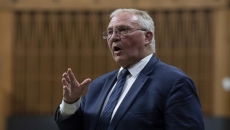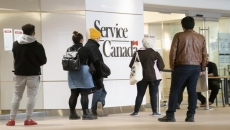Canada's premiers are growing impatient with Prime Minister Justin Trudeau's failure to schedule a meeting to discuss their demand for at least $28 billion more each year for health care.
Trudeau agreed in early September to hold a virtual first ministers' meeting dedicated to the subject of the annual federal transfer payment to provinces and territories for health care.
But no date has yet been set for the discussion.
Premiers have now issued a statement pointing out that "many weeks have passed" since Trudeau agreed to a meeting and calling on him to confirm a date "without further delay."
The federal government this year will transfer to the provinces nearly $42 billion for health care, under an arrangement that sees the transfer increase by at least three per cent each year.
But the premiers say that amounts to only 22 per cent of the actual cost of delivering health care and doesn’t keep pace with yearly cost increases of about six per cent.
They want Ottawa to increase its share to 35 per cent and maintain it at that level, which would mean an added $28 billion this year, rising by roughly another $4 billon in each subsequent year.
On top of the annual transfer this year, the federal government has given the provinces an extra $19 billion to help them cope with the fallout from the COVID-19 pandemic, including more than $10 billion specifically for pandemic-related health-care costs.
But the premiers say that extra money is one-off; what they need is an increase in annual transfers to ensure stable, long-term funding.
"Premiers have been calling on the federal government to become a full funding partner for years and COVID-19 has only increased the urgent need for a federal response," Quebec Premier François Legault, the current chair of the premiers' Council of the Federation, said in a statement Friday.
"The fundamental imbalance in the way health services are funded in Canada can no longer be sustained."
While Trudeau is willing to discuss the issue, Intergovernmental Affairs Minister Dominic LeBlanc has said the “critical question” is whether the federal government has the fiscal capacity to meet the premiers' demand now.
The federal government has already shovelled unprecedented amounts of money into emergency relief benefits and other measures to help Canadians weather the pandemic and continues to dole out billions more as the second wave of the deadly coronavirus grips the country.
As a result, the federal deficit this year alone is forecast to hit nearly $400 billion.






